Remembering Quincy Jones—American Music Giant Who Produced ‘Thriller’
by Best Classic Bands Staff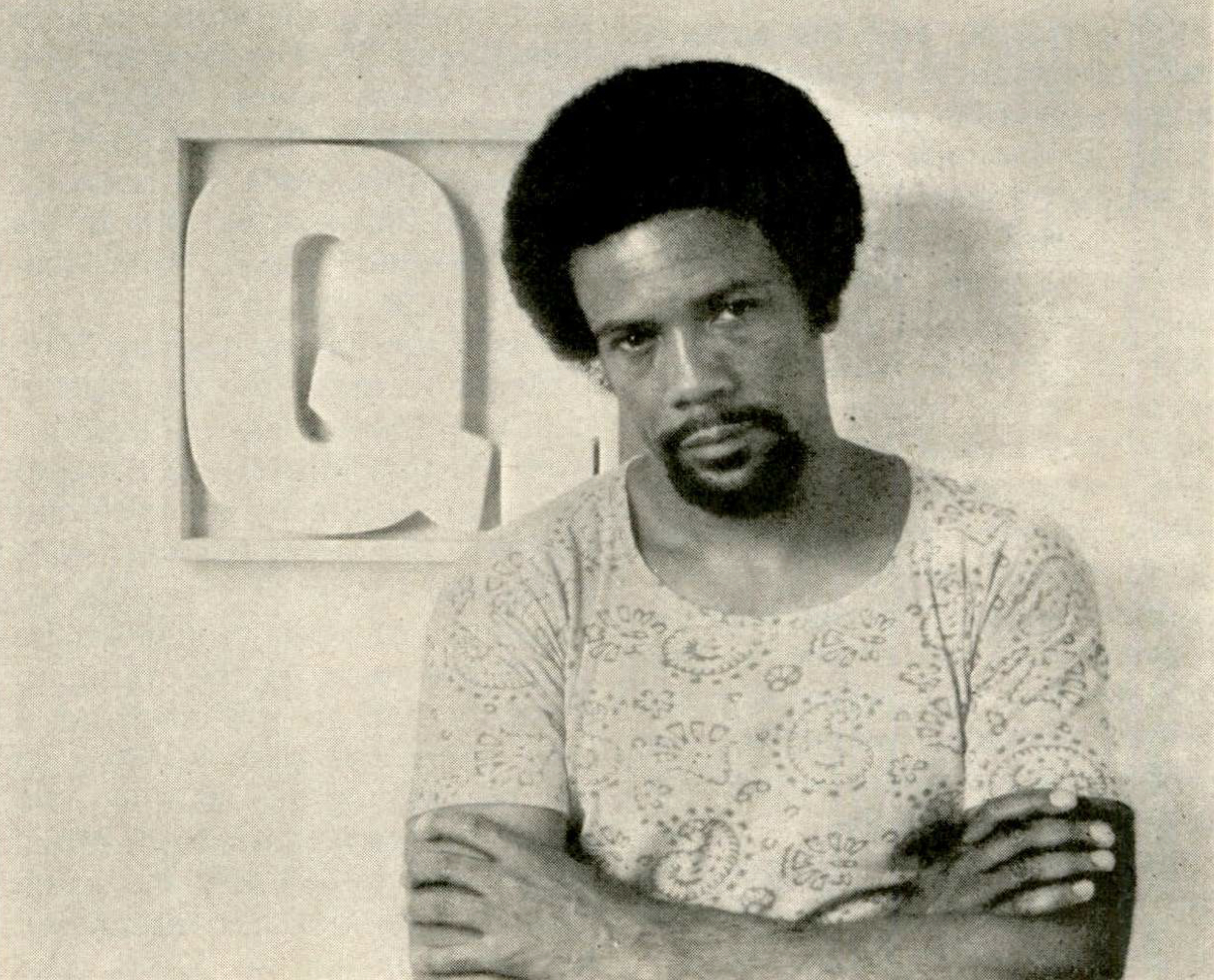 Quincy Jones, the American music legend best known as the producer of Michael Jackson’s Thriller, died on Nov. 3, 2024, of pancreatic cancer on Nov. 3, 2024, in Bel Air, Calif., at 91.
Quincy Jones, the American music legend best known as the producer of Michael Jackson’s Thriller, died on Nov. 3, 2024, of pancreatic cancer on Nov. 3, 2024, in Bel Air, Calif., at 91.
Long before his association with Jackson began in 1979, Jones was one of the music world’s most accomplished composers, arrangers, producers and bandleaders, having worked with such legendary artists as Frank Sinatra, Count Basie, Dizzy Gillespie and Ray Charles, to name a few. All of those giants have passed.
Jones, born March 14, 1933, on the South Side of Chicago, was the subject of a special section in the music industry trade magazine Record World in November 1976, to celebrate his 20th anniversary in the business. At that point, Jones estimated that he had participated in producing, arranging and/or playing on more than 1,000 albums.
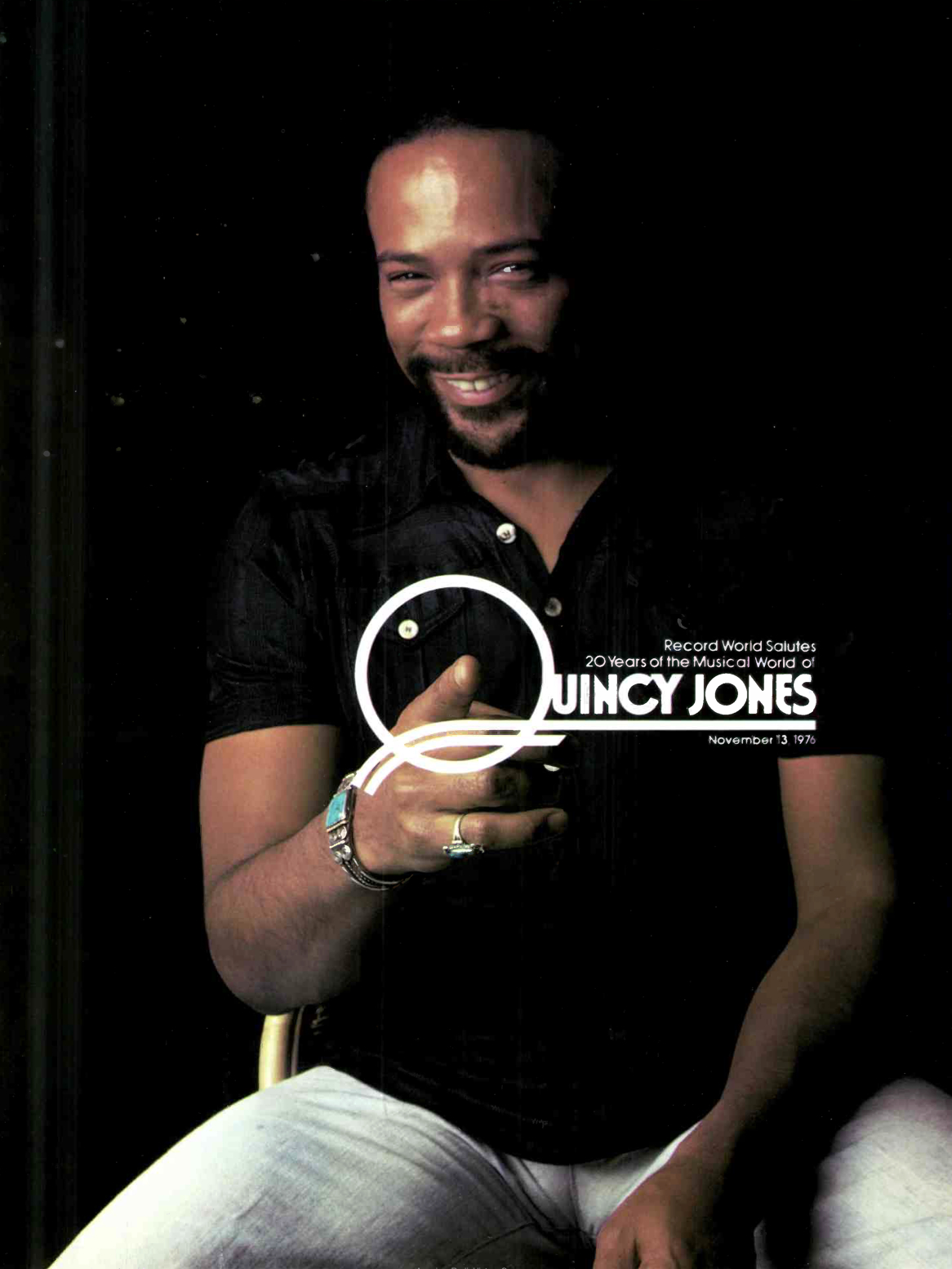
He was associated with jazz early in his professional career, but it wasn’t the genre in which he began. “I started in a gospel quartet, at 11 or 12 years old,” he told Record World‘s Roberta Skopp. “And then I got into playing with high school bands and stuff—marching and everything—concert bands, and dance bands.
Related: Our Album Rewind of Jones’ Back on the Block
“The first band that I got together with that was really our own group was—well, we played jazz and R&B. California blues bands came around all the time so that’s all we ever saw. It was really a mixing, because we used to do comedy, all kinds of stuff. We had to pull our ages up because we worked in a club and we were about 14.
“I met Ray Charles in Seattle—he was 16 then. He had just come in from Florida and between his band and our band we had about every gig in town. We used to work together a lot with big bands and had jam sessions. It was bebop. We used to play other things, but our heart was in that. At that time, I heard Louis Armstrong and [Billy] Eckstine and Dizzy [Gillespie]’s band come through and they were playing a lot of complicated things, which was much more challenging in itself.”
Jones’ recording career began in the early ’50s while he was still a student on a scholarship at the Berklee College of Music in Boston, where he gained a reputation among the school’s instructors as a hard-working, extremely proficient composer and arranger. [He was bestowed an Honorary Doctorate of Music from the school in 1983.] He took a leave of absence to tour Europe with Lionel Hampton’s Premier Band, with whom he had already collaborated. [Years earlier, Hampton had wanted the 15-year-old Jones to join his band. “I was going to run away from home, but his wife put me off the bus and said I was too young.”]
Upon his return to the States, Jones’ studio career blossomed as he began writing and producing for Dinah Washington. During that period, he produced such female stars as Ella Fitzgerald, Sarah Vaughan and LaVern Baker.
Jones had a fruitful association with Gillespie that continued to fill his calendar. In 1956, the jazz trumpeter and bandleader asked him to put a band together for him for the State Department to travel in the Middle East. When they returned, they played the White House Correspondents Dinner and then toured South America.
By the early ’60s, Jones was serving as a vice president at Mercury Records, “doing 250,000 miles a year traveling.” In 1963, he produced a pair of hits, “It’s My Party” and “You Don’t Own Me,” for the teenaged Lesley Gore, which reached #1 and #2, respectively, in Billboard.
At the same time, Jones was working with some of the world’s finest male vocalists, including his childhood partner, Ray Charles. Jones was 33 when he arranged and conducted 1966’s legendary album Sinatra Aa the Sands with Count Basie and the Orchestra.
Jones also collaborated with such jazz giants as Duke Ellington, Milt Jackson, Oscar Peterson and Lester Young, along with Henry Mancini, and others. By his own 30th birthday in 1963, Jones had already recorded a dozen albums under his own name. His 1962 single, “Soul Bossa Nova,” had a second life when it was featured in the title theme for the 1997 film, Austin Powers: International Man of Mystery.
By the mid-’60s, Jones became a much- sought-after composer for Hollywood, scoring, conducting and/or producing numerous movie soundtracks, including 1967’s In the Heat of the Night, In Cold Blood, The Italian Job and Cactus Flower.
In 1969, he began an artistic marriage with Herb Alpert and Jerry Moss’ A&M Records, with annual releases that proved to be significant in terms of both creativity and commerce. His Smackwater Jack in 1972 became his third consecutive release to win the Grammy for Best Instrumental Pop, Rock, or Folk Performance.
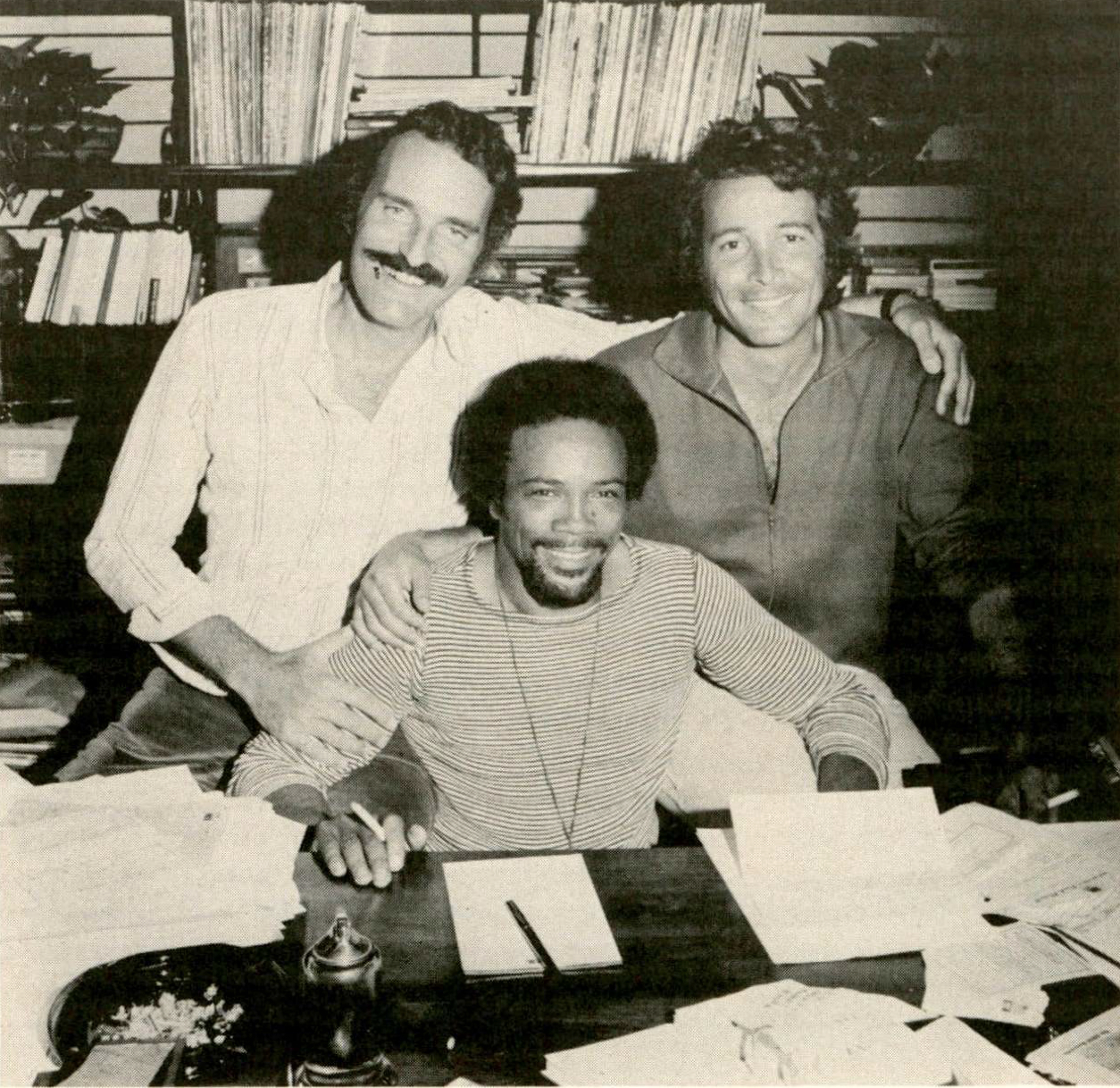
Quincy Jones with A&M Records’ Jerry Moss and Herb Alpert.
The year 1974 was a turning point, with his biggest album to date, Body Heat. This milestone was a change of sorts for Jones: gone was the big-band brassy sound that had come to be identified with the sound of “Q.” In its place was a new emphasis on the rhythm section and vocal sound. The move proved to be a fruitful one, for it earned him his first gold record and served as the introduction of Jones’ discoveries the Brothers Johnson. Each of the funk and R&B band’s first four albums—all produced by Jones—went platinum, thanks to such chart-toppers as “I’ll Be Good to You” and “Stomp!”
They joined him on his tour in the summer of 1976, “The Musical World of Quincy Jones,” along with a 20-piece youth orchestra. All the while, he was busy with the 12-hour music score for the ambitious mini-series based on the novel by Alex Haley, Roots, which aired in January 1977, and for which he won the Emmy award for Outstanding Music Composition for a Series.
Jones first production of a Michael Jackson album, Off the Wall, in 1979, reached #3 in Billboard, but it was 1982’s Thriller that broke all music business records. The album, which spent 37 weeks at the top of the Billboard album chart, included seven songs released as singles, among them “Billie Jean” and “Beat It,” both of which went multi-platinum, and the title track, the video for which revolutionized the field of music video when it went into regular rotation on MTV. Thriller remains the best-selling album of all-time, with sales estimated at more than 70 million worldwide.
In 1985, Jones produced the hugely successful charity benefit single, “We Are the World,” co-written by Michael Jackson and Lionel Richie, and credited to USA for Africa—an ad hoc supergroup featuring 46 of the music world’s biggest singing stars backed by a quickly assembled group of instrumental accompanists.
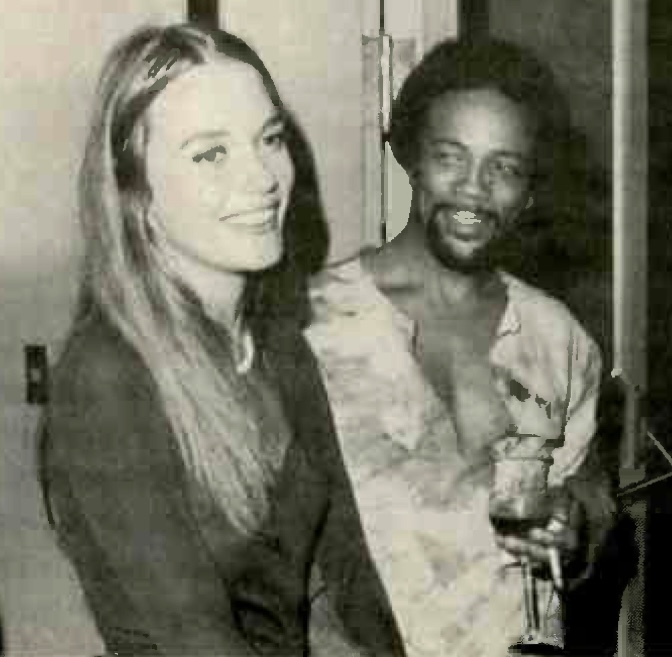
At the time of his 1976 special feature, Quincy Jones had been married for two years to actress Peggy Lipton.
Jones earned 28 Grammy awards—third all-time, as of 2024—and is a recipient of the Recording Academy’s Grammy Legend Award. His numerous other honors includes induction into the Rock and Roll Hall of Fame in 2013, the Kennedy Center Honors in 2001, the National Medal of Arts in 2011. His numerous albums under his own name include the platinum successes Sounds… and Stuff Like That!!!,The Dude, Back on the Block and Q’s Jook Joint. His recordings are available in the U.S. here and in the U.K. here.
Related: Our Album Rewind of Back on the Block
“This moment, this evening, this spot where I stand tonight was not my destination when I was young and full of vinegar. I did not engineer this journey. To tell you the truth, I don’t think I could even see this far.” — Quincy Jones accepting the Jean Hersholt Humanitarian Award… pic.twitter.com/NaKyFyTPoW
— The Academy (@TheAcademy) November 4, 2024
In a lengthy tribute, Paul McCartney wrote, “I felt privileged to have known him for many years. He was friends with George Martin, the Beatles’ producer and, between the two of them, produced some very fine music.
“Quincy or ‘Quince’ or ‘Q,’ as he was known, always had a twinkle in his eye and had a very positive, loving spirit which infected everyone who knew him. His work with Michael Jackson is, of course, legendary and he had so many other strings to his musical bow.
“My main recollections of him were always the private moments that we shared, and I will never stop thanking Nancy for always arranging to visit him when we were in Los Angeles. These visits were fun and inspiring.
His long career stretches back to the early days when he was a trumpet player, then a band leader, then a producer of many great records. But it is as a friend I would like to remember him. We always had fun in his presence and his legend will continue through the years, but it is those private moments we were lucky enough to have with the great man that I will always remember fondly.”
Today, we say goodbye to the legendary Quincy Jones—a musical giant whose genius reshaped our world and left an enduring legacy. Rest well, Quincy. #legend pic.twitter.com/boVx2ZsIUh
— Morgan Freeman (@morgan_freeman) November 4, 2024
From Elton John: “Nobody had a career as incredible as Quincy Jones. He played with the best and he produced the best. What a guy. Loved him.”
Related: Musicians we’ve lost in 2024




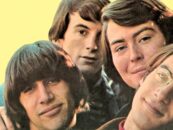
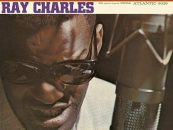

1 Comment so far
Jump into a conversationI bought Smackwater Jack and the Dude when they first came out. I still am amazed at the arrangements. Just fantastic albums .